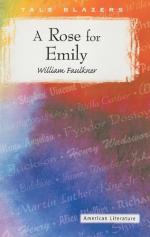|
This section contains 683 words (approx. 3 pages at 300 words per page) |

|
A Rose for Emily
Summary: In "A Rose for Emily," William Faulkner's skillful use of words and time allows insight into the life of Miss Emily without even hinting at the morbid finale. Faulkner's choice of narrator, his references to the Old South, and his unconventional plot leads his readers to places he wants them to be.
In "A Rose for Emily," William Faulkner purposes to surprise and shock his readers. His skillful use of words and time allows insight into the life of Miss Emily without even hinting at the morbid finale. Faulkner's choice of narrator, his references to the Old South, and his unconventional plot leads his readers to places he wants them to be; he gives them just enough to keep them in suspense. He uses subtle clues to foreshadow a ghastly outcome. References to smell, decay, and Miss Emily's corpse like appearance all guide his readers to the climatic end's ultimate irony
In choosing a simple town folk as his narrator Faulkner keeps intimacy at bay. These people in Emily's community saw her as the recluse on the hill, and would not be aware of everything occurring in her life. This would allow Faulkner his ending. Anyone closer to Emily, say...
|
This section contains 683 words (approx. 3 pages at 300 words per page) |

|


